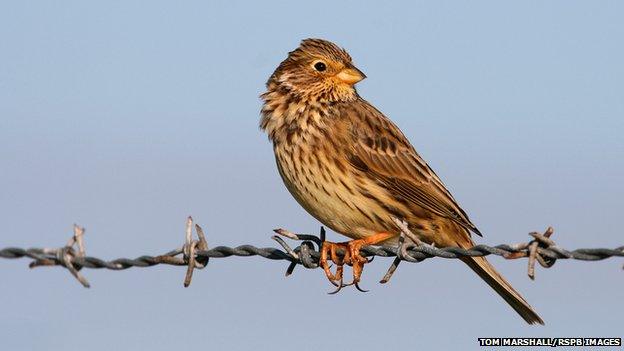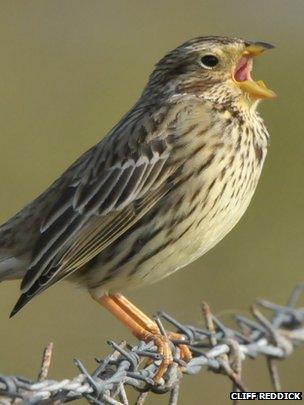Corn bunting disappears from Barra and Vatersay
- Published

UK corn bunting populations have suffered from dramatic declines in numbers, according to the RSPB
A farmland bird is thought to have vanished from parts of the Western Isles and is facing extinction in other areas, RSPB Scotland has warned.
For the first time since monitoring for corn bunting calls began, the birds have not been heard on Barra or Vatersay.
One territorial male has been spotted on Benbecula.
The RSPB said parts of the Uists were now the last strongholds of the buntings in the Western Isles.
Corn buntings, which are also known as the fat bird of the barley, are an RSPB red list species having suffered "dramatic population decline" across the UK.

Male corn buntings have a distinctive call that helps scientists estimate their numbers
RSPB manager Jamie Boyle said: "For the first time ever, spring-time in the machair of Barra and Vatersay has been marked without the distinctive rattling song of the corn bunting.
"Since time immemorial this wee brown bird has been a familiar sight and sound to crofters going about their business.
"We are gravely concerned that this may not be the case in the future."
The RSPB is planning to take emergency action to conserve bunting hot spots on the islands.
Modern agriculture has been blamed for depriving the birds of winter food.
Falling numbers of corn buntings have been observed for a number of years.
Variations in the songs of different groups of buntings in the Western Isles have helped scientists to chart the decline in numbers.
By studying the pattern of male birds' songs, researchers can identify different groups of buntings.
In the past males could find enough mates within their own groups.
But Aberystwyth University scientists reported last year that the dialect groups were beginning to mix together suggesting males were flying further to find mates.
In August last year, RSPB Scotland said only 800 breeding pairs of corn bunting were believed to remain in Scotland.
The charity said an Aberdeenshire population had declined from 134 pairs to only 12 over a 20-year period.
- Published21 September 2012
- Published3 August 2012